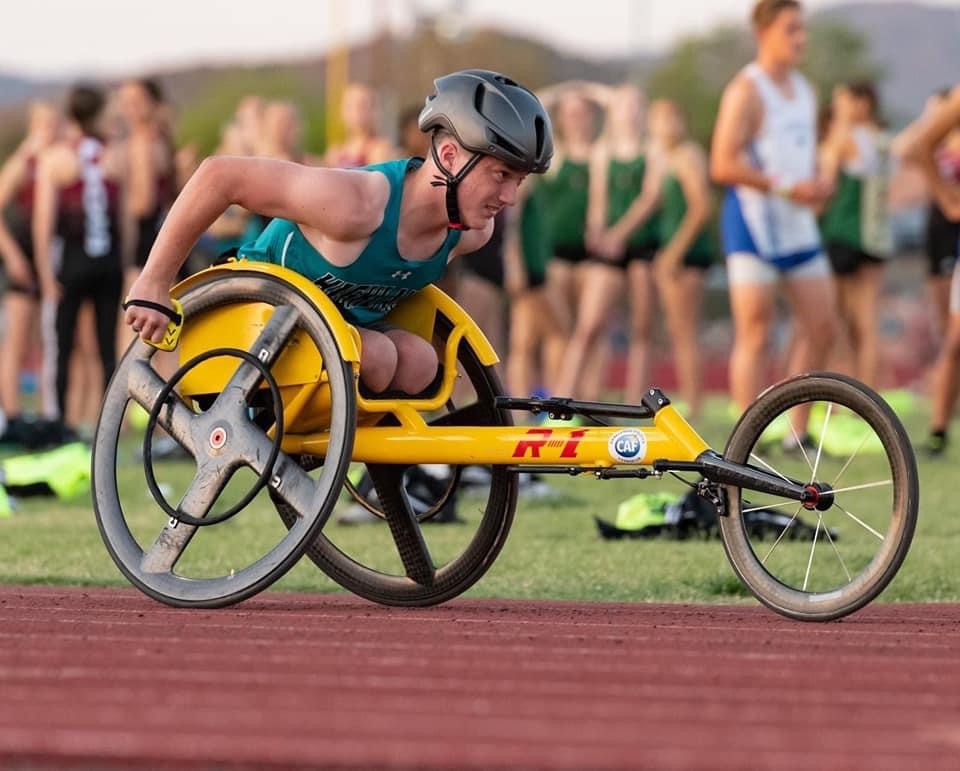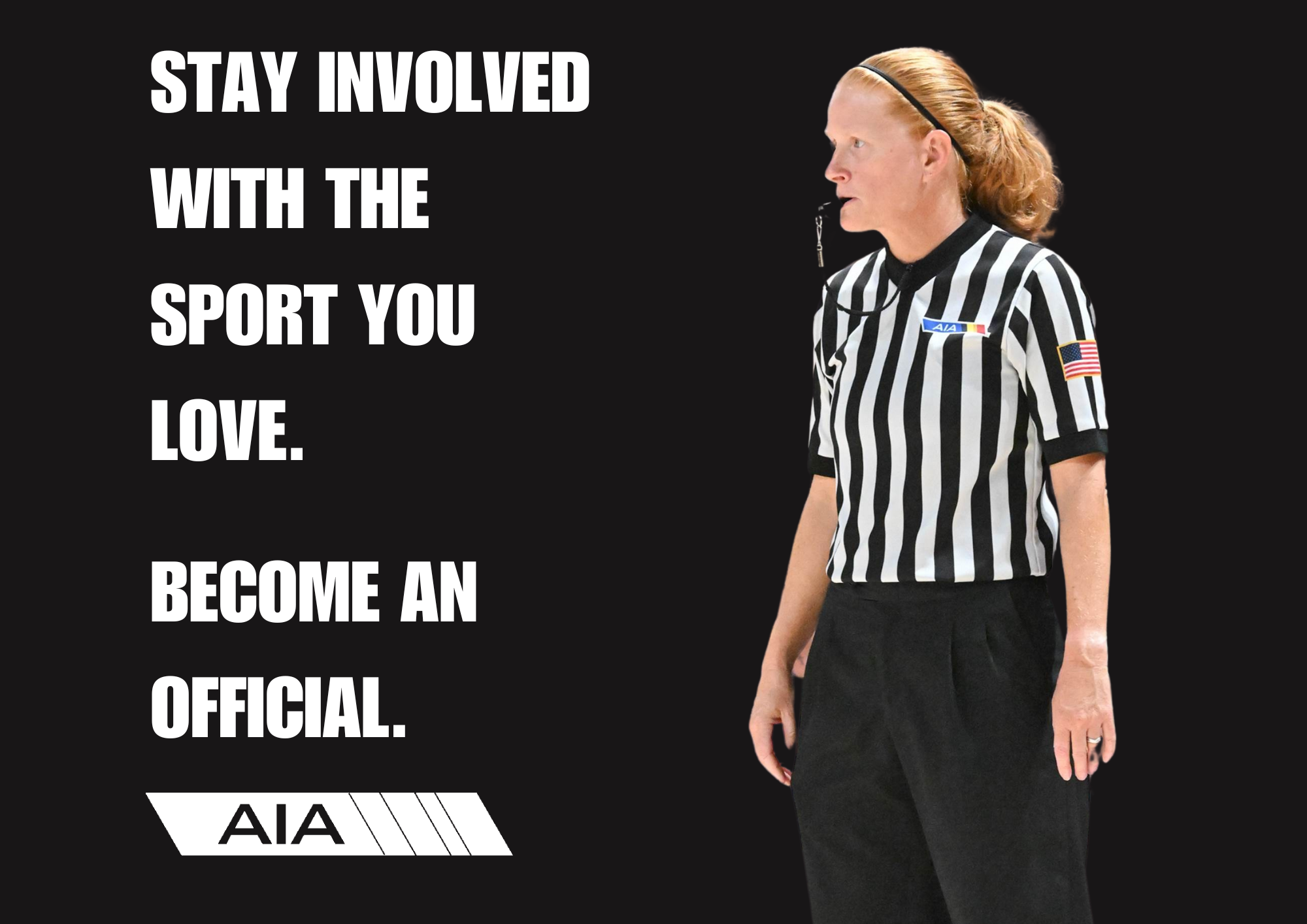Scanlan beats personal records on the track
April 14, 2021 by Catie Cheshire, Arizona State University

Catie Cheshire is an ASU Cronkite School of Journalism student assigned to cover Highland for AZPreps365.com
In the Scanlan family, athletics is their birthright.
Highland freshman Gabriel Scanlan is the second of four children, all of whom are involved in sports thanks to dedication from their parents, Ben and Sandee Scanlan.
“That's my parents’ fault,” Gabriel said. “They introduced me first to wheelchair basketball, and I fell in love with the sport.”
Because he was born with spina bifida, Gabriel has no feeling from his knees down so he plays wheelchair basketball and uses a track chair, which has three wheels and a platform he kneels on, to run track.
He started competing in track at 5 years old through Arizona Disabled Sports in Mesa. He also plays wheelchair basketball through Arizona Disabled Sports and Ability360.
“We did it not as much for the sport aspect in the competition but more for his personal growth,” Ben said.
Watching his kids grow up, Ben knows the impact athletics can have on any kid. In the wheelchair basketball league, he’s seen kids go from being shy to being chatterboxes over the course of one season.
“I don't think he would have gotten the characteristics of the personality that he has today without the sports,” Ben said of his son.
Because of that, Ben views sports mainly as a way for Gabriel to grow as a person, although he said they talk about Gabriel making a run at competing in the Paralympics and plan to support him if he chooses to seriously pursue that route.
Ben and Sandee’s avid support is one reason Gabriel ended up on the track team at Highland.
Due to the COVID-19 pandemic, most of the events through Arizona Disabled Sports and Ability360 were canceled, so the Scanlans asked Highland coach Robin Hagen if Gabriel could use the track at Highland to train. Hagen said he could do more than just use the track—she wanted him as a full member of the squad.
“I happened to be in the right place at the right time,” Hagen said. “I was here finishing up practice, and they were just wondering if they could work on the track with him and I'm like, ‘He's a Highland student. Let's just have him join our team.’”
Sandee said Hagen has been, “like a dream” for the family, exemplifying their experience at Highland overall, which she described as fantastic.
Gabriel competes in the 100-meter, 200-meter and 400-meter as well as throwing shot put, discus and javelin.
He likes the 200 and 400 best because, “The 100 is over too fast.”
In meets against other athletes with disabilities, Gabriel said he’s more competitive. At Highland he focuses on beating his personal records and improving for his next meet with other athletes who are disabled.
This year, he shaved five seconds off his 400 time, clocking in at 1 minute, 10.51 seconds for a personal record.
“That's what track is all about,” Hagen said. “It's all about getting better for yourself, better and better each meet.”
Gabriel’s season with Highland ended Wednesday, but he will compete in the Desert Challenge Games through Arizona Disabled Sports in May against other athletes with disabilities.
“That's where I'm gonna have the highest expectations for myself,” Gabriel said.
Competing with other athletes who are disabled is one reason Gabriel likes basketball better than track and field.
Gabriel described himself as a very social person so he prefers basketball because it’s team-centered compared to track and field where he competes in individual events.
Though he competes alone, he described Highland’s track team as welcoming. Being a team player is so important to Gabriel that it flows into his personal life where he’s a Nets fan because his favorite NBA player is Kyrie Irving.
“I like players that are good, but also are very team-oriented like, ‘Hey, I'm not gonna take every single shot,’” Gabriel said. “I like players like him.”
One of the Scanlan’s favorite basketball moments was when Gabriel made his first basket. Despite starting at age 5, Gabriel didn’t make a basket until he was 8 years old.
“It was crazy, like, oh my gosh I just made the basketball shot,” he said.
Ben said that’s typical for wheelchair basketball. Since the players are seated, an eight-foot basket is even farther away than it is for children who play while standing.
“It's funny watching these kids advance from barely getting it off their laps to getting it feet off the ground and actually making an eight-foot shot, That's why it was a cool milestone,” Ben said.
For Sandee, the best part of Gabriel’s journey isn’t just one moment. It’s seeing how, over time, he’s gone from trailing off at the end of races to finishing every race strong.
Whenever Gabriel competes, the stadium erupts into cheers before the race even starts. Sandee believes that’s because most people never see anyone using a track chair. According to the Centers for Disease Control, about 1,427 babies are born with spina bifida each year. That’s 1 out of every 2,758 births.
Sandee questioned why more of those babies don’t grow up to be high school athletes. After seeing how great it’s been for Gabriel it’s her hope more people might follow suit.
“If you don't have a personality like ours that's really outgoing, you're gonna get lost in the shuffle,” Ben said. “It's unfortunate. Hopefully he can shed some light.”
Though Sandee said Gabriel carries the weight of representing the disability community well for someone so young, she also knows he gets frustrated with the cheers and claps because he just wants to be seen as a competitor like everyone else.
“We haven't raised him as if he's got obstacles to overcome, which, in the abled-bodied community, they can't really understand,” Ben said.
Hagen said having Gabriel on her team changed her mindset for when she’s coaching any athlete. Now, she focuses on what her athletes can do instead of what they can’t.
“That’s been a terrific lesson for me as a coach,” she said. “Instead of, ‘Oh my gosh, they're not the fastest; they can't jump the highest,’ it’s what can they do?”



